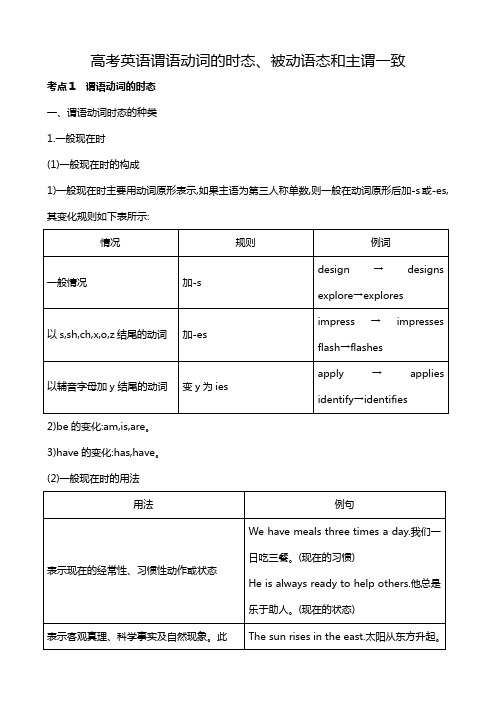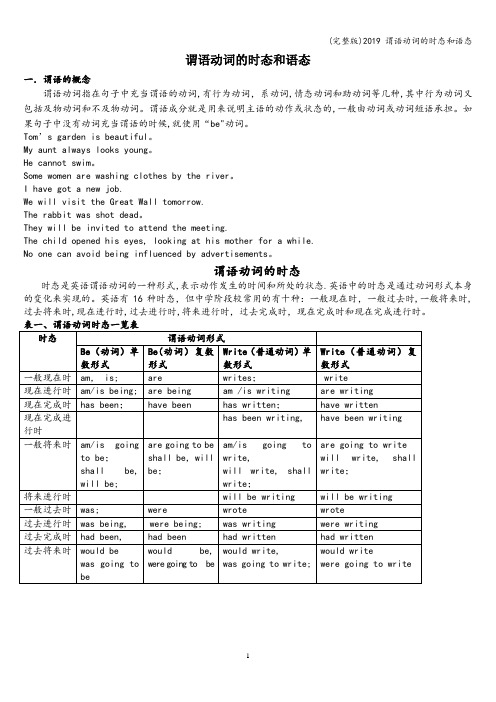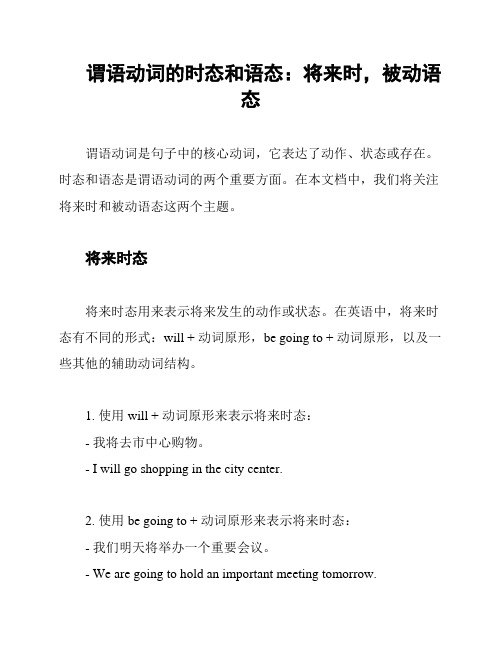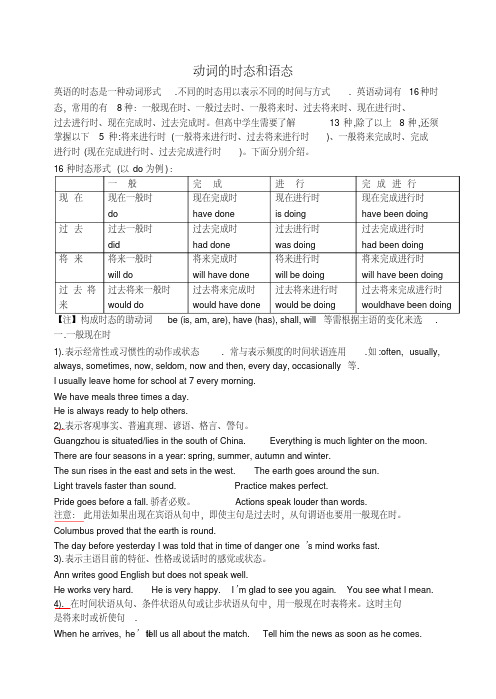2019谓语动词的时态和语态
【语法课件】谓语动词的时态、语态和主谓一致

doing
been doing have been doing
1.一般时态 (1)一般现在时 ①表示经常或习惯性的动作,多用动作动词,且常与表频率的时间状语连用。 We have meals three times a day.我们一日吃三餐。 ②表示客观真理、科学事实及自然现象。 The sun sets in the west.太阳从西方落下。 ③在时间、条件状语从句中常用一般现在时代替一般将来时。 I'll write to her when I have time. 有时间我会写信给她。
②一般将来时的常用结构
·用于“I expect,I'm sure,I think,I wonder+宾语从句”中 ·用于“祈使句+and+陈述句”中 ·与表示时间或条件的状语从句连用
Don't worry about the exam.I'm sure you'll pass. 不要担心这次考试,我确信你会通过的。 If you ask him,he will help you. 如果你请他帮忙,他会帮助你的。
③ 表 示 位 置 转 移 的 动 词 可 用 进 行 时 代 替 将 来 时 。 这 样 的 动 词 有 go , come , start,leave,arrive,begin,return等。 I'm leaving for Beijing next month. 我下个月要去北京。 (2)过去进行时(was/were+现在分词) 过去进行时表示在过去某个时刻或某段时间正在进行的动作或存在的状态。 He was reading an interesting book this time yesterday. 昨天这个时候他在读一本有趣的书。
高考英语谓语动词的时态、被动语态和主谓一致

高考英语谓语动词的时态、被动语态和主谓一致考点1 谓语动词的时态一、谓语动词时态的种类1.一般现在时(1)一般现在时的构成1)一般现在时主要用动词原形表示,如果主语为第三人称单数,则一般在动词原形后加-s或-es,其变化规则如下表所示:2)be的变化:am,is,are。
3)have的变化:has,have。
(2)一般现在时的用法2.一般过去时(1)一般过去时的构成1)一般过去时用动词的过去式表示,其规则动词变化方法如下表所示:2)was用于第一、三人称单数,were用于其他情况。
3)注意以元音字母加y结尾的动词:规则变化是直接加-ed,如play→played;不规则变化是把y 改为id,如:pay→paid,say→said。
(2)一般过去时的用法3.一般将来时(1)一般将来时的构成(2)一般将来时的用法4.现在进行时(1)现在进行时的构成:is/am/are+现在分词(2)现在进行时的用法5.过去进行时(1)过去进行时的构成:was/were+现在分词(2)过去进行时的用法6.现在完成时(1)现在完成时的构成:has/have+过去分词(2)现在完成时的用法注意(1)瞬间动词若用于现在完成时且与表示一段时间的时间状语连用,需在谓语动词、时态或句型方面作相应变化。
如:他参军3年了。
(×)He has joined the army for 3 years.(√)He has been in the army for 3 years.(换动词)(√)He joined the army 3 years ago.(换时态)(√)It has been/is 3 years since he joined the army.(换句型)(2)部分瞬间动词(词组)与延续性动词(词组)对应表7.过去将来时(1)过去将来时的构成(2)过去将来时的用法8.将来进行时(1)将来进行时的构成:will/shall be doing(2)将来进行时的用法9.过去完成时(1)过去完成时的构成:had+过去分词(2)过去完成时的用法10.现在完成进行时(1)现在完成进行时的构成:have/has been doing(2)现在完成进行时的用法二、谓语动词时态的呼应1.主将从现2.含宾语从句的句子的时态一致问题(1)宾语从句中的动词时态常受主句谓语动词时态的制约,如果主句谓语动词为一般现在时或一般将来时,宾语从句中的谓语动词可以不受影响。
(高考时态和语态(谓语动词))

高考时态、语态(谓语动词)的用法时态的用法一.定义顾名思义,时是事情发生的时间,态是动词表现的形态。
也就是说,随着事情发生的时间不同而变化的动词形态就是时态。
时态就是“时间+动词形态”的结合。
与语文相比,时态是英语所特有的。
二.分类时态主要分为两大类,那就是现在时态和过去时态。
时态总共有16种。
其中,高中阶段要求掌握12种。
具体谓语动词的形时态必须保持一致。
做好时态、语态的相关试题,还要注意时间的先后性、同时性以及根据语意所暗示的时态。
三.时态用法1.一般现在时⑴含义:一般现在时表示现在经常性、习惯性的动作或现在(长久)存在的状态。
也可表示客观事实、科学真理、公理、原理、定理、规律、规则、法则、谚语、自然现象和生活常识等。
一般现在时具有习惯性或长久性,它是不受时间限制的客观存在。
(即:所有或任何时候都发生的动作或情况。
)⑵结构:(肯定形式)do(动词原形)或does(动词单三形式)和be(am/is/are);(否定形式)don’t do(动词原形)或doesn’t do(动词单三形式)和be(am not/isn’t/aren’t)⑶时间标志:now(=these days),nowadays,at present(=at the present time)等。
⑷常用的频度副词有:often、usually、always、seldom、sometimes、every day/week/month/year...、on Sunday(s) . . .等。
eg:①I often go to school on foot.②She is a good student in her class.注:一般现在时的特殊用法。
⑴一般现在时可表示一般将来时㈠表示按时间表拟定、计划安排或日程安排早就定好的事情㈡指按时刻表将要发生的事情。
此时,常用趋向性动词(如:come、go、leave、arrive等及do、have、plan、take、begin、start等)。
(完整版)2019 谓语动词的时态和语态

谓语动词的时态和语态一.谓语的概念谓语动词指在句子中充当谓语的动词,有行为动词,系动词,情态动词和助动词等几种,其中行为动词又包括及物动词和不及物动词。
谓语成分就是用来说明主语的动作或状态的,一般由动词或动词短语承担。
如果句子中没有动词充当谓语的时候,就使用“be"动词。
Tom’s garden is beautiful。
My aunt always looks young。
He cannot swim。
Some women are washing clothes by the river。
I have got a new job.We will visit the Great Wall tomorrow.The rabbit was shot dead。
They will be invited to attend the meeting.The child opened his eyes, looking at his mother for a while.No one can avoid being influenced by advertisements。
谓语动词的时态时态是英语谓语动词的一种形式,表示动作发生的时间和所处的状态.英语中的时态是通过动词形式本身的变化来实现的。
英语有16种时态,但中学阶段较常用的有十种:一般现在时,一般过去时,一般将来时,过去将来时,现在进行时,过去进行时,将来进行时,过去完成时,现在完成时和现在完成进行时。
一般现在时(the simple present tense )1. 经常性或习惯性的动作,常与表示频腮度的时间状语连用。
时间状语:every…, sometimes, on Sunday sI leave home for school at 7 every morning. He sometimes stays in bed until lunch time。
如何判断谓语和非谓语(语法填空)(无答案)

如何判断谓语和非谓语2019年高考语法填空最大的变化就是增加了动词的考查。
具体来说,全国1卷、2卷和3卷分别都是给了5个动词提示。
通常来讲,给动词提示要先判断是谓语还是非谓语,然后填写相应正确的形式。
可是不少学生缺乏判断句中动词是谓语还是非谓语的能力,下面我们来探讨这个问题。
要找到句子谓语动词,就必须先找到主语。
一般简单的主语很容易找到,但是很多时候句子的主语很复杂,导致学生很难发现。
复杂主语通常包括下列情形:含有连词如and, both...and..., either...or..., neither...nor..., not only...but (also), as well as等;非谓语动词结构做主语;主语从句充当主语;同位语结构做主语等。
请看下面例句(均来自近年高考试题,斜体部分是句子的主语,划横线的就是谓语):Those who were highest in status in high school, as well as those least liked in elementary school, are “most likely to engage (从事) in dangerous and risky behavior.”(as well as 连接those who...与those least liked ...做主语)The gunners like to describe what they do as character-building, but we know that to wound an animal and watch it go through the agony(痛苦) of dying can make nobody happy. (动词不定式to do结构做主语)Connecting to the community(社区)as you freely give your time, money, skills, or services provides a real joy. (-ing形式做主语)Dismissing small talk as unimportant is easy, but we can’t forget that deep relationships wouldn't even exist if it weren’t for casual conversation. (-ing形式做主语)What you need is a great teacher who lets you make mistakes. (主语从句充当主语)Shackleton,a onetime British merchant-navy officer who had got to within同位语结构做主语)找到了句子的主语,谓语就不难发现了。
谓语动词的时间语态及进行语态

should have been studying
would have been studying
谓语动词的时间语态
当所说的事情发生在不同时间时,英语句子的谓语要“变脸”, 出来的样子叫“时间语态”简称“时态”。 时态是英语谓语最大的一种变脸,它一共有8个变化,也叫8个时 态,它们分别是:
20 years by that summer.
感 谢
感 谢
阅阅
读读
2.一般过去时态(V-ed)
当谓语动词发生在”现在以前”时间内,我们就说动作发生 在
“一般过去”时间内。
表达这个时段的时间词可以是yesterday, long time ago,5 years ago, two days early, in 1949,at the end of last year, when you came, he said等 I watched TV last night. They were here only a few minutes ago
6.过去将来时态(should+V)
当谓语动词的动作发生在“从过去看将来”时间时,动词的 动
作发生在“过去将来”时间段内。
当讲一个过去的事件时,事件中又提到一件将要发生的事。 这个事件就发生在“从过去看将来”时间里,比如“昨天他 说他要去国外旅游”。这里的“去”就发生在过去将来时间 里。 He told me he would go to Beijing. I didn't know if he would come.
3. 将来进行时(shall/will + be+ v- ing) You will be making a mistake.
谓语动词的时态和语态:将来时,被动语态

谓语动词的时态和语态:将来时,被动语态谓语动词是句子中的核心动词,它表达了动作、状态或存在。
时态和语态是谓语动词的两个重要方面。
在本文档中,我们将关注将来时和被动语态这两个主题。
将来时态将来时态用来表示将来发生的动作或状态。
在英语中,将来时态有不同的形式:will + 动词原形,be going to + 动词原形,以及一些其他的辅助动词结构。
1. 使用 will + 动词原形来表示将来时态:- 我将去市中心购物。
- I will go shopping in the city center.2. 使用 be going to + 动词原形来表示将来时态:- 我们明天将举办一个重要会议。
- We are going to hold an important meeting tomorrow.3. 其他辅助动词结构用来表示特定的将来动作或状态:- 我明天会正在吃午饭。
- I will be having lunch tomorrow.被动语态被动语态用于强调动作的接受者而不是执行者。
在被动语态中,谓语动词以一种形式变为动作的接受者。
被动语态的形式为:be + 过去分词。
1. 将主动语态转换为被动语态:- 主动语态:他吃了这个苹果。
- 被动语态:This apple has been eaten by him.2. 如果主动语态中有物主代词,需要将其作为被动语态的主语,并使用对应的被动语态动词形式:- 主动语态:我们修理了这辆车。
- 被动语态:This car was repaired by us.被动语态可以用来强调行为的接受者,或者在不知道或不关心动作执行者时使用。
总结谓语动词的时态和语态在句子中起着重要的作用。
将来时态用于表示将来发生的动作或状态,可以使用 will + 动词原形、be going to + 动词原形或其他辅助动词结构。
被动语态用于强调动作的接受者,可以通过将主动语态动词转换为 be + 过去分词的形式来表达。
谓语动词的时态和语态

动词的时态和语态英语的时态是一种动词形式.不同的时态用以表示不同的时间与方式. 英语动词有16种时态,常用的有8种:一般现在时、一般过去时、一般将来时、过去将来时、现在进行时、过去进行时、现在完成时、过去完成时。
但高中学生需要了解13种,除了以上8种,还须掌握以下5种:将来进行时(一般将来进行时、过去将来进行时)、一般将来完成时、完成进行时(现在完成进行时、过去完成进行时)。
下面分别介绍。
16种时态形式(以do为例):一般完成进行完成进行现在现在一般时do 现在完成时have done现在进行时is doing现在完成进行时have been doing过去过去一般时did 过去完成时had done过去进行时was doing过去完成进行时had been doing将来将来一般时will do 将来完成时will have done将来进行时will be doing将来完成进行时will have been doing过去将来过去将来一般时would do过去将来完成时would have done过去将来进行时would be doing过去将来完成进行时wouldhave been doing【注】构成时态的助动词be (is, am, are), have (has), shall, will 等需根据主语的变化来选.一.一般现在时1).表示经常性或习惯性的动作或状态. 常与表示频度的时间状语连用.如:often, usually, always, sometimes, now, seldom, now and then, every day, occasionally等.I usually leave home for school at 7 every morning.We have meals three times a day.He is always ready to help others.2).表示客观事实、普遍真理、谚语、格言、警句。
- 1、下载文档前请自行甄别文档内容的完整性,平台不提供额外的编辑、内容补充、找答案等附加服务。
- 2、"仅部分预览"的文档,不可在线预览部分如存在完整性等问题,可反馈申请退款(可完整预览的文档不适用该条件!)。
- 3、如文档侵犯您的权益,请联系客服反馈,我们会尽快为您处理(人工客服工作时间:9:00-18:30)。
谓语动词的时态和语态一.谓语的概念谓语动词指在句子中充当谓语的动词,有行为动词,系动词,情态动词和助动词等几种,其中行为动词又包括及物动词和不及物动词。
谓语成分就是用来说明主语的动作或状态的,一般由动词或动词短语承担。
如果句子中没有动词充当谓语的时候,就使用“be”动词。
Tom’s garden is beautiful.My aunt always looks young.He cannot swim.Some women are washing clothes by the river.I have got a new job.We will visit the Great Wall tomorrow.The rabbit was shot dead.They will be invited to attend the meeting.The child opened his eyes, looking at his mother for a while.No one can avoid being influenced by advertisements.谓语动词的时态时态是英语谓语动词的一种形式,表示动作发生的时间和所处的状态.英语中的时态是通过动词形式本身的变化来实现的。
英语有16种时态,但中学阶段较常用的有十种:一般现在时,一般过去时,一般将来时,过去将来时,现在进行时,过去进行时,将来进行时,过去完成时,现在完成时和现在完成进行时.一般现在时(the simple present tense )1. 经常性或习惯性的动作,常与表示频腮度的时间状语连用。
时间状语:every…, sometimes, on SundaysI leave home for school at 7 every morning.He sometimes stays in bed until lunch time.My mother never comes to see me. They often listen to the radio in bed.Mike usually goes to bed at 10 o’clock. Our teacher frequently checks our homework.2. 客观真理,客观存在,科学事实。
The earth moves around the sun. Laziness results in poverty.London stands on the Thames. Reading broadens one’s horizon.3. 表示在时间上已确定或安排好的事情,下列动词:come, go, arrive, leave, start, begin, return的一般现在时表将来。
The train leaves at six tomorrow morning. When does the bus start It starts in ten minutes.4. 在时间状语从句和条件状语从句,如果主句用将来时,从句用一般现在时来表示将来。
If it rains tomorrow, I will stay at home. I'll let you know as soon as he arrives.即时练:用括号中词语的正确形式填空AThe Sawyers live at 87 King Street. In the morning, Mr. Sawyer 1__________ (go) to work and the children go to school. Their father 2__________ (take) them to school every day. Mrs. Sawyer3__________ (stay) at home every day. She 4__________ (do) the housework. She always 5__________ (eat) her lunch at noon. In the afternoon, she usually 6__________ (see)her friends. They often7__________ (drink)tea together. In the evening, the children 8__________ (come) home from school. They arrive home early. Mr. Sawyer 9__________ (come) home from work. He 10__________ (arrive) home late. At night, the children always do their homework. Then they 11__________ (go)to bed. Mr. Sawyer usually 12__________ (read) his newspaper, but sometimes he and his wife 13__________ (watch)television.BI carried my bag into the hall.“What are you doing” my landlady 1__________(ask).“I am leaving, Mrs. Linch,” I answered.“Why are you leaving” she asked. “You have been here only a week.”“A week 2__________(be) too long, Mrs. Linch,” I said. “There 3__________(be) too many rules in this house. My friends never 4__________(come) to visit me. Dinner 5________(be) always at seven o’clock, so I frequently 6__________ (go) to bed hungry. You 7__________(not like) noise, so I rarely 8__________(listen) to the radio. The heating 9__________(not work), so I always 10 __________(feel) cold. This is a terrible place for a man like me. Goodbye, Mrs. Linch.”一般过去时(the simple past tense )一般过去时表示过去某个时间里发生的动作或状态;过去习惯性、经常性的动作、行为;过去主语所具备的能力和性格。
1. 在特定的过去时间里所发生的动作或存在的状态。
时间状语有:just now, yesterday, last week, an hour ago, the other day, in 1982等。
Yesterday, he wrote a very formal letter of apology to Douglas.I borrowed three books from the library last week.2. 表示在过去一段时间内,经常性或习惯性的动作。
When I was a child, I often played football in the yard of my house.Wherever the Browns went, they were given a warm welcome.3. 一般过去时在特殊句型中的应用:1)It is high time that sb. did sth. "时间已迟了""早该……了"It is high time that you went to bed.你早该睡觉了。
It is high time that you started to work. 你该动工了。
2) would (had) rather sb. did sth.表示'宁愿某人做某事'I would rather you knew that now than afterwards. 与其以后让你知道,不如现在就让你知道。
I would rather you saw me off at the airport tomorrow. 我但愿你明天来机场送我。
3) I wish that…(与现在事实相反)I wish this book was written in bigger characters. 我希望这本书的字再大一点儿。
I wish I knew all about this matter. 这件事我要是全知道就好了I wish you would come back to Washington with us, but that's for you to decide.我希望你能和我们一起回华盛顿,但是这由你决定。
4)If…(与现在事实相反)If you knew English, you could get a job easily. 如果你懂得英语,你就能容易地找到一份工作。
If he were free, he would help us. 要是他有空的话,它会帮助我们的。
即时练CPostcards always spoil my holidays. Last summer, I 1__________(go) to Italy. I 2__________(visit) museums and 3__________(sit) in public gardens. A friendly waiter 4__________(teach) me a few words of Italian. Then he 5__________(lend) me a book. I 6__________(read) a few lines, but I7__________ (not understand) a word. Everyday I 8__________(think) about postcards. My holidays9__________(pass) quickly, but I 10__________ (not send) cards to my friends. On the last day I11__________(make) a big decision. I 12__________(get) up early and 13__________(buy) thirty-seven cards. I 14__________(spend) the whole day in my room, but I 15__________( not write) a single card!DIn order to encourage the students to take outdoor exercise, our school 1__________ (organize) a mountain-climbing last Sunday. Hundreds of us 2__________ (take) part in it.It 3__________ (be) a nice day.At 8:00 am,we 4__________ (gather) at the foot of Daqing Moutain and set out for the top in high spirits.All the way we were chatting,singing and laughing,enjoying the fresh air and the beautiful scenery.When some 5__________ (fall) behind,others would come and offer help.About 2 hours later,we all 6__________ (reach) the top.Bathed in sunshine,we jumped and 7__________ (cheer) with joy.The activity 8__________ (benefit) us a lot.Not only 9__________ (do) it get us close to nature and give us relaxation from heavy school work,it also promoted the friendship among us.What a wonderful time we 10__________ (have)!概念:现在进行时表示正在发生或进行的动作。
